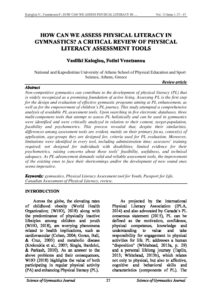Abstract: Non-competitive gymnastics can contribute to the development of physical literacy (PL) that is widely recognized as a promising foundation of active living. Assessing PL is the first step for the design and evaluation of effective gymnastic programs aiming at PL enhancement, as well as for the empowerment of children’s PL journey. This study attempted a comprehensive analysis of available PL assessment tools. Upon searching in five electronic databases, three multi-component tools that attempt to assess PL holistically and can be used in gymnastics were identified and were critically analyzed in relation to their content, target-population, feasibility and psychometrics. This process revealed that, despite their similarities, differences among assessment tools are evident, mainly on their primary focus, context(s) of application, age-groups they are designed for, criteria used for PL evaluation. Moreover, limitations were identified in every tool, including administration time; assessors’ training required; not designed for individuals with disabilities; limited evidence for their psychometrics, raising concerns about those tools’ feasibility, usefulness, and technical adequacy. As PL advancement demands valid and reliable assessment tools, the improvement of the existing ones to face their shortcomings and/or the development of new sound ones seems imperative.

